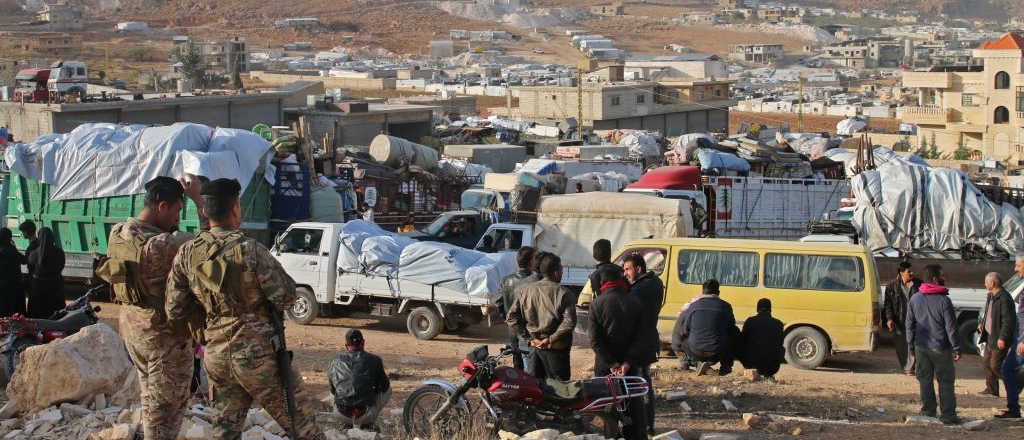Syrians escaping intensified violence in Lebanon are encountering severe risks upon returning to Syria, facing repression, arbitrary detention, and torture at the hands of the Syrian government, as reported by Human Rights Watch (HRW). Since late September 2024, a surge in Israeli airstrikes in Lebanon has forced hundreds of thousands of Syrians to flee back to Syria. According to the Syrian Observatory for Human Rights (SOHR), these attacks have resulted in at least 2,710 fatalities, including over 200 Syrians.
Returning Syrians, particularly men, face heightened threats from Syrian authorities, who continue to target individuals suspected of evading military service or holding opposition views. HRW documented several arrests of Syrians at border crossings, where they were detained by Syrian Military Intelligence without explanation or contact with their families. Among those detained, two Syrian men reportedly died in custody under suspicious circumstances after being deported from Lebanon and Turkey in recent years.
Adam Coogle, deputy Middle East director at HRW, highlighted the dangers for returning Syrians. “The deaths in custody of deportees under suspicious circumstances underscore the severe risk of arbitrary detention, abuse, and persecution,” he said. “There is an urgent need for effective monitoring of rights violations in Syria.”
The exodus has placed immense strain on humanitarian agencies. The United Nations High Commissioner for Refugees (UNHCR) and the Syrian Arab Red Crescent (SARC) have reported that over 440,000 people, the majority of whom are Syrian, fled from Lebanon to Syria through official border crossings between September 24 and October 22. Many others crossed unofficially, with significant numbers of women and children among them. These agencies are leading emergency aid efforts at the borders and in local host communities, with Syria easing immigration procedures to accommodate the influx.
Human rights organizations, however, warn that Syria is not a safe destination. HRW and the Syrian Network for Human Rights (SNHR) report cases of Syrians being detained or forcibly disappeared after returning from Lebanon. Families of detainees, often uninformed about the arrests, continue to plead for information regarding their loved ones. HRW also highlighted Syria’s restrictive policies on humanitarian access to detention sites, which obscures the full scale of abuses and prevents rights organizations from monitoring the conditions of returnees effectively.
The crisis has also exacerbated tensions in Lebanon, where displaced Syrians face deteriorating conditions. With the escalating conflict, some shelters prioritize Lebanese and Palestinian nationals, leaving Syrians with limited support. The pre-existing anti-Syrian sentiment has intensified, with reports of Syrians being evicted from rented homes to make way for displaced Lebanese families. Many Syrians had already been living in a hostile environment, facing harsh restrictions and increased xenophobia designed to push them toward repatriation.
In addition, some European leaders are advocating for the return of Syrian refugees, despite ongoing instability in Syria. HRW calls on these countries to acknowledge Syria’s lack of safety and to halt any forced or facilitated returns. The UNHCR has also reiterated its stance from March 2021, maintaining that Syria is not safe for returns and that repatriation efforts should only resume once conditions are secure and dignified.
Humanitarian organizations and international donor governments are urged to provide essential support to Syrians displaced within Syria, ensuring that aid does not inadvertently encourage premature returns. Countries enforcing sanctions on Syria, including the U.S., the U.K., and EU nations, should enact humanitarian exemptions to enable unrestricted access to essential services.
The ongoing threat of persecution in Syria, particularly for those accused of pro-opposition views, is compounded by widespread economic hardship and deteriorating living conditions. Syrian returnees face challenges in securing livelihoods and shelter, with much of the infrastructure destroyed by years of conflict. As the UN Commission of Inquiry on Syria reported, lawlessness prevails, with various groups exerting control through extortion and violence.
Despite calls for reform, the Syrian government continues to repress those it deems a threat. Cases of suspicious deaths in custody, such as that of Ahmad Nemer al-Halli, who died after being tortured at a Syrian detention center, and Abdulghani Mounir, who was electrocuted during detention, underscore the dangers Syrians face upon return.
For now, the return of Syrians from Lebanon to Syria reflects the dire reality of limited options rather than an improvement in Syria’s conditions. Coogle concludes, “Their return is not a sign of improved conditions in Syria, but a consequence of being shut out of safer alternatives, forcing them back into a perilous environment of detention, abuse, and even death.”


